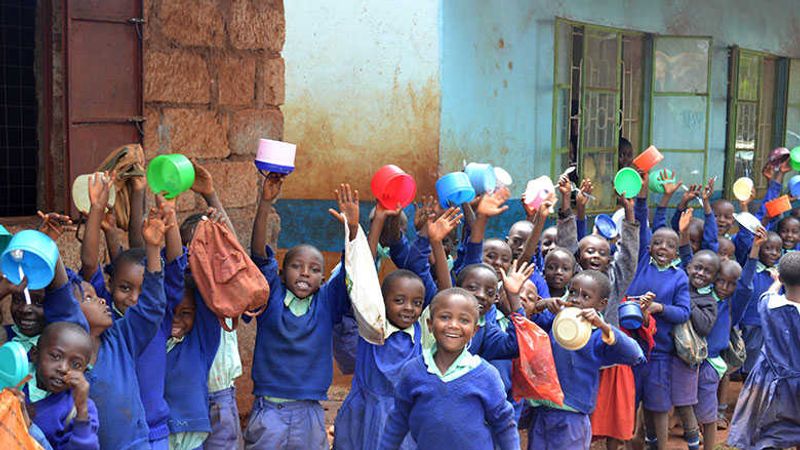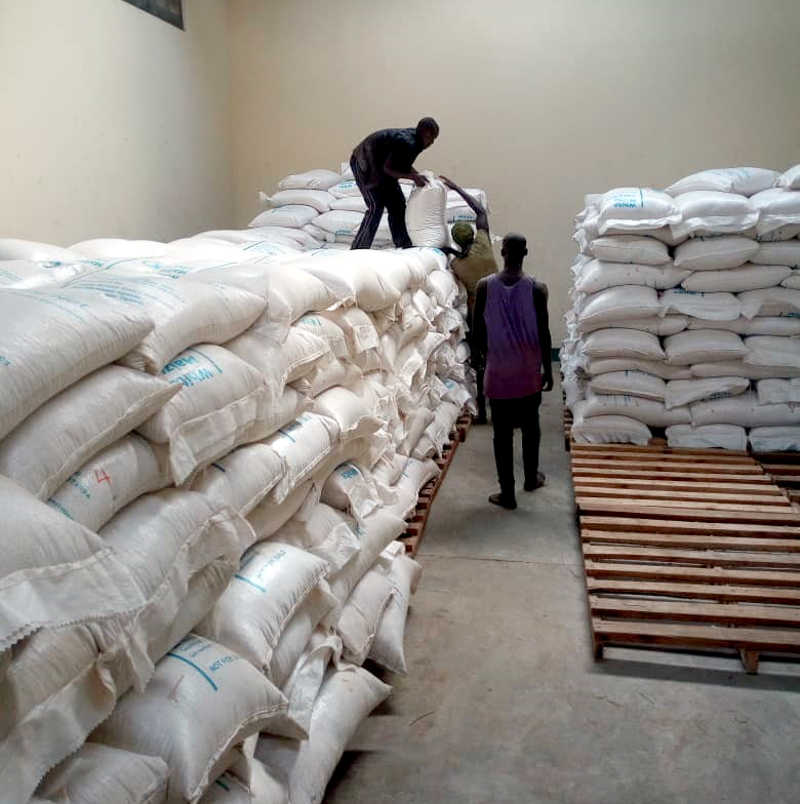

The World Food Programme (WFP) in Uganda is using its grain purchase programme in the remote north-eastern region of Karamoja, to assist Uganda to achieve human development goals such as food security, improved education, reduced child malnutrition and hunger and peace and security.
Through its school feeding programme, which is implemented uniquely in Karamoja, WFP buys maize grain from groups of smallholder farmers, and supplies it to schools in the region to feed children and their teachers during the school term.
This month WFP bought 80 metric tons from two small-scale farmers’ groups – Namalu Farmers’ Association (35 metric tons) and Napak District Farmers’ Association (45 metric tons). The food was worth UGX115 million (nearly US$30,000). The food will be used to feed more than 8,000 children for 65 days when schools re-open after the COVID–19 -related lockdown.

Up to 80 tones of grain has been bought by WFP in May 2020 and set to be distributed to schools in Karamoja when schools resume at the end of the COVID-19 lockdown
“The purchase of grain from small-holder farmers has not only impacted positively on education,” WFP’s Country Director El-Khidir Daloum told The Sunrise, adding that: “It has improved the incomes of farmers in Karamoja by creating a market for a considerable amount of their produce – for the third year in a row — in support of Uganda’s agricultural development goals regarding Karamoja.”
The prospect of making some money by the farmers is helping to achieve several social-economic objectives that would probably not be achieved without the programme, in which WFP collaborates with local governments and the central government. The incomes from this sale will support farmers to prepare for the new planting season, pay school fees, meet costs of health care and contribute to building their resilience to shocks.
This arrangement of connecting local agriculture to schools in Karamoja, globally known as Home-Grown School Feeding, boosts food production among smallholder farmers’ groups. It improves incomes of rural households through a predictable market and makes food available in schools, thereby reducing hunger among learners. Furthermore, it enables participation of communities in feeding their children, enhancing the sustainability of the initiative.
Home-Grown School Feeding is endorsed by the African Union’s New Partnership for Africa’s Development (NEPAD) initiative and supports the Uganda government’s School feeding Karamoja programme.
In addition to the grain bought from the Karamoja farmers and other farmers elsewhere in Uganda, WFP provides schools with beans and cooking oil fortified with Vitamin A and D. Vitamin A is essential in brain development and improves eyesight, while Vitamin D boosts a person’s immune system.
In 2019, WFP reached 315 schools, providing more than 155,000 children (46 percent girls, 54 percent boys) with a daily hot meal at school, using funding from the governments of Ireland and Germany.
“School feeding contributes to improved learning, encourages vulnerable families to send their children, particularly girls, to school and eases the burden of parents having to feed their children at home, especially during the lean season,” Daloum said.
Dating as far back as 1983, WFP’s School Feeding has been contributing to keeping children in school despite frequent episodes of drought and conflicts, which disrupt agricultural production, human security and peaceful co-existence among communities.
In 2019, the proportion of girls attending school in Karamoja increased by 7 percent. The overall school attendance improved from 63 to 71 percent, whereas enrollment increased from 7 to 15 percent. The provision of meals, as well as other inputs from the schools, local governments and other UN agencies are contributing to this positive trend in Karamoja
School attendance remains a successful approach to preventing early marriage, child pregnancies, and trafficking of girls.
Throughout 2019, WFP focused on supporting Uganda to establish and maintain a nationally-owned school feeding programme linked to local agricultural production. Together with the Education and Karamoja Affairs ministries, WFP laid a foundation to gradually shift from a WFP-led programme in Karamoja to Home Grown School Feeding in Karamoja and elsewhere in Uganda.
Sustainability issues
Being a donor-driven exercise, some people have raised questions about the programme’s sustainability, especially in light of volatile global economic situations that threaten to make dependency on donations a risky prospect.
Already, WFP has scaled back its school-feeding activities in Karamoja in recent years from three meals to two a day.
There are now calls for communities and governments to take over the school-feeding programmes.
Fagil Mandy, a renowned education consultant and former chairperson of the Uganda National Examinations Board told IRIN that: “We must stop the dependency culture in Karamoja. The Karimojong must be taught on how to grow food instead of giving them food. They can’t continue depending on relief food and donations for their survival.”
“We need more concerted efforts to help the Karimojong grow their own food. We need to marshal programmes for small- and large-scale agriculture in Karamoja. This will enable people to grow enough food for themselves and provide school meals for their children,” he said.
In Kenya, the government there has since June 2018, taken full ownership of the national school feeding programme, and is now providing hot meals to over 1 million children across the country.
WFP says that an increasing number of countries have over the past ten years adopted or considered school feeding as a critical areas of investment.
It is hopped that the growing evidence on the benefits of the Homegrown School Feeding Programme, will attract the interest and resources of governments and other players in the development arena as seen by the way it has risen on the agenda of global fora including the World Economic Forum.













Henry Lutaaya
Leave a Comment
Your email address will not be published.